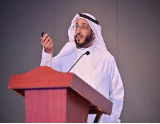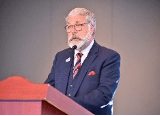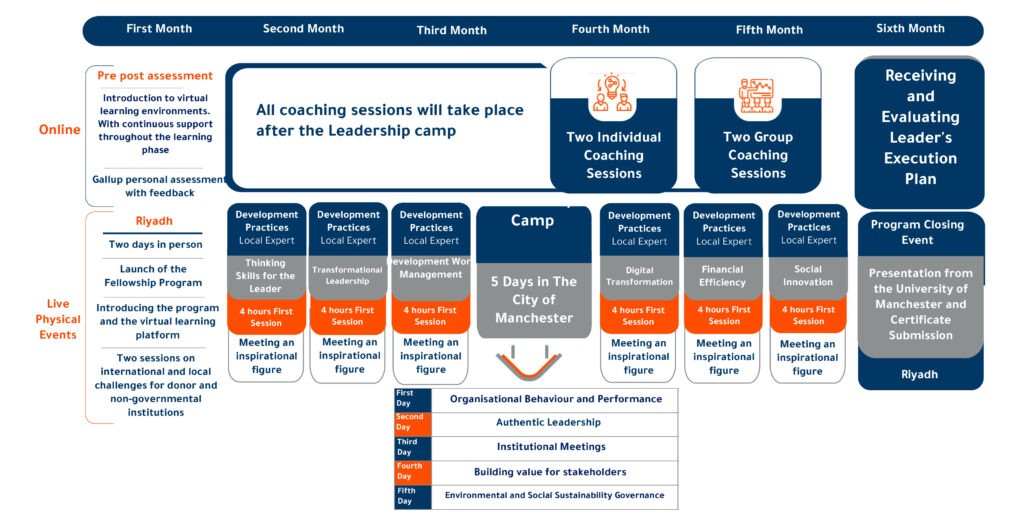Program title:
Saudi British Fellowship for NFP Leadership
Price: –
Duration: 6 Months
Location: (Riyadh, kingdom of Saudi Arabia) – (Manchester, United Kingdom)
Dates: To Be Confirmed
Overview (Program Idea):
A program that supports leaders in the nonprofit sector in the Kingdom of Saudi Arabia to enhance the capabilities of their organizations and their potential for achieving their goals through strategic planning, supporting their organizations, and empowering stakeholders in the sector to perform their roles. This is accomplished through a list of competencies and a set of core skills, tools, and technologies.
What they say:
“This program is different from other similar programs in several aspects that invite individuals to participate. Firstly, the extensive preparation that preceded this program. Secondly, the partnership with such executive programs that hold a high level of social responsibility makes this prestigious university the first, and this encourages participation in the program. Additionally, the spirit of this fellowship places great emphasis not only on the leader as a leader but also on their team and dealing with other stakeholders who operate within the executive leader’s environment in our nonprofit work.”
–
“The program is wonderful, and it is the first of its kind when it comes to leadership. Additionally, it marks the first entry into collaboration with the British sector, specifically the University of Manchester, which is one of the world’s top universities in business schools. In addition to the nonprofit sector, this program is rich and diverse, including in-person training sessions and visits during the leadership camp in Manchester, UK. This enriches leadership skills and the nonprofit sector.”
–
“We are delighted to join the Saudi-British Fellowship in Developmental Work Leadership, which reflects the nonprofit sector’s interest in this type of fellowship and the significant studies offered by nonprofit organizations in leadership. These studies have a direct impact on nonprofit organizations, including civil society institutions and associations. Especially today, civil associations operate in an organized manner with a significant role for leadership in contributing to the nonprofit sector. We are happy to be part of the Saudi-British Fellowship, and we hope that its positive effects will be reflected on the nation. We thank the organizers and trainers for their excellent organization, which is reflected in the outstanding preparation, training modules, and enriching materials. The selection of trainers and experts, whether from the University of Manchester or the nonprofit sector, is of a high caliber.”
–
“The efforts to build the capabilities of workers in the non-profit sector are highly commendable. It started early, and as a result, fellowships, and executive management development programs, among many others, were established. We celebrated the launch of the Saudi-British Fellowship Program in Development Leadership, thanks to the dedicated efforts of our colleagues in Leadership Development and several non-profit organizations. The Council of Non-Profit Organizations is very pleased and anticipates, with God’s permission, clear results following the signing and launch of this program. Therefore, we have great hope that this program will make a significant contribution to leadership development, capacity building, and the graduation of the first cohort. The program is expected to expand to include a wide range of programs and initiatives. This journey will be remembered with gratitude, and its reputation will grow as we witness its impact in achieving the goals of Vision 2030 in the Kingdom”.
The program rationales (Justifications):
Striving to adopt the best practices of the sector and contemporary experiences within the regional context, rather than solely relying on traditional approaches to leadership development.
Who is it for?
Senior executives, CEOs, board members, and second-tier leaders in the nonprofit sector.
Why should I choose the Saudi-British Fellowship for NPF Leadership Program?
Applying core leadership skills specific to the nonprofit sector.
Increasing effectiveness as a leader who can guide others through influence and persuasion skills.
Applying different levels of leadership within diverse contexts using distinctive leadership approaches.
Reflecting on personal practices within leadership roles, which is a highly effective learning style.
Earning an internationally recognized fellowship certificate from a prestigious educational institution in the United Kingdom.
What will I learn?
Communicating vision and strategy.
Inspiring and motivating teams and individuals.
Identifying development opportunities in the work environment and improving quality.
–
Key People:
1- Dr. Mohammed Alzaghibi: Ph.D. in Instructional Design, Diploma in Corporate Governance, Diploma in Behavioral Motivation.

—
2- Dr. Stephen Brookes: Professor of Leadership at the University of Manchester and international leadership trainer.

—
3- Dr. Abdullah bin Ali Al-Dubaikhi: bachelor’s degree in electrical engineering from King Fahd University of Petroleum and Minerals. And a master’s degree in business administration from the University of Oxford, UK. He is currently the CEO of Bahri.

—
4- Professor Jonatan Pinkse: Professor of Strategy, Innovation, and Entrepreneurship and Executive Director at the Manchester Institute of Innovation Research (MIOIR), Manchester Business School, University of Manchester. He analyzes how companies make their strategic decisions to adapt to a more sustainable economy.

—
5– Dr. Jeff Thomas: Professor of Organizational Psychology at the Manchester Business School and former consultant with Deloitte, Jeff has over 20 years of experience in executive education and leadership development.

—
6- Dr. Eunice Maytorena-Sanchez: Eunice joined the Alliance Manchester Business School (AMBS) in October 2004 from the Manchester Centre for Civil and Construction Engineering at UMIST.

—
7- Dr. Ghassan Siddiqui: PhD in Electrical Engineering – Automatic Control – Loughborough University of Technology in Britain, master’s degree in computer engineering from Oregon State University in USA, bachelor’s degree in electrical engineering from King Fahd University of Petroleum and Minerals.

—
8- Dr. Saleh Al-Muhaimid: Founder and Chairman of the Board of Directors of the Center for Leadership Studies.

—
9- Dr. Hassan Shuraim: PhD in Educational Administration, Master of Education, Secretary-General of the Abdullah bin Ibrahim Al-Subaie Foundation.

—
10- Eng. Majid Al-Osaimi: Bachelor’s degree in information systems in 2004 from King Saud University.

—
11- Eng. Sami Al-Husseian: Postgraduate Studies in Network and Mobile Agency Security in 2002 from the University of Idaho, Computer Science from Southern Methodist University

—
12– Russell Miller: Expert in the nonprofit sector and executive training program design at the Manchester Business School.

—
13- Ms. Amanda Collins: Professional Development Program Design and former Managing Director of Pearson Education in the Middle East.

–
Details
-
Phase One – Launch and Learning (Riyadh)
- Program preparation and planning.
- Materials and activities.
- Application of the Learning Styles Assessment.
- Development Work Practices & Insights sessions:
1- Strategic Thinking:
Building effective plans that align with the organization’s objectives, assisting in the development of long-term plans, identifying goals, priorities, risks, and potential opportunities, which help the organization towards development.
2- Transformational Leadership:
Explore new concepts, methods, and approach of leadership, understand transformational leadership and its applications in the work environment, the foundations on which it is based, and identify the characteristics of a transformational leader.
3- Development work management:
Employing administrative principles and legislative frameworks in managing the organization and evaluating its performance and benefiting from successful administrative experiences in managing development work.
-
Phase Two – Leadership Camp (University of Manchester, UK)
Leadership challenges.
Field visits.
Elevator pitch presentations.
Unit 1: Organizational Behavior and Performance (OBP):
The unit will discuss the complex and important relationship between organizational behavior and performance. Organizational behavior provides insights into how employees, leaders, teams and systems function, influence each other, and in turn affect performance in organisations. Understanding and managing organisational behaviour is crucial in the NFP sector in order to perform effectively. Fellows will consider the different measures of performance. Examples include effectiveness, efficiency, quality, innovation, community and stakeholder satisfaction, financial results, and other relevant metrics. Fellows will further explore how motivation, leadership, group dynamics and organizational culture explain and improve human behavior in the workplace.
Unit 2: Authentic Leadership:
This unit will explore approaches that emphasize genuineness, transparency, selflessness and self-awareness. As leaders, Fellows will be encouraged to be true to themselves, align their actions with their values, and build relationships based on trust and integrity. A key learning theme is that authentic leaders strive to bring out the best in themselves and others by fostering an environment of open communication, collaboration, and personal development.
Unit 3: Building value for stakeholders (BVfS)
The unit will emphasize the importance of creating and delivering benefits that meet stakeholders’ needs and expectations and explore how stakeholders’ interests and respective influencing factors can be identified and considered. A stakeholder is a broad term that encompasses various individuals, groups, organizations, and networks who have a vested interest in the activities and outcomes of Fellows’ organizations. This analysis is particularly challenging in the NFP sector. Learning and application are vital to this process, as organizations must continually adapt and evolve to effectively address stakeholder concerns and enhance their value proposition.
Unit 4: Environmental and social sustainability and governance (ESG):
The unit will discuss what it means for organizations to contribute to achieving the sustainable development goals by strategizing for environmental and social sustainability and governance. Managing sustainability has become crucial for organizations in the NFP sector to operate responsibly and manage risk. Fellows will learn how strategizing for sustainability will enable their organizations to gain both collaborative and competitive advantage, create the conditions for innovation, and foster a foundation to achieve long-term success in the NFP goals and objectives. Engaging with stakeholders and complying with ethical standards and regulations will be essential learning outcomes.
- Phase Three – Post-Camp – Continuing Learning (Riyadh)
- Development Work Practices Meetings (Kingdom of Saudi Arabia):
4- Digital Transformation:
Transforming the business model into a model based on technologies and artificial intelligence in providing services, serving beneficiaries, and managing human resources, especially with the multiplicity of needs of beneficiaries and their differences to serve them efficiently and with high quality.
5- Financial efficiency:
Building financial and accounting awareness of leaders, and basic practices related to financial management. Demonstrate ways to develop the financial sustainability of the organization, through understanding the funding and grant mechanisms, and the financial performance of the organization.
6- Social Innovation:
Empower leaders to address evolving social needs before they escalate. Adopt creative approaches, leverage technology, explore new intervention models, respond to emerging challenges, and adapt strategies to meet the evolving needs of the communities they serve.
- Presentation of the participant’s official Challenge Plan.
- Evaluation and Conclusion.
Details: 1.2
The program will be delivered in person, where it will be conducted face-to-face. The program is designed to enable participants to learn from each other’s experiences and confront their challenges. Interaction and active participation will be a fundamental part of the program delivery, with small group discussions forming a central component.
Program Timeline:

Who should apply?
- Senior leaders looking to transition to an inspirational leadership role in the KSA
NFP sector.
- Experienced professionals who aspire to develop new entrepreneurial social ventures in the KSA NFP sector.
- Aspirant future KSA NFP leaders who are exceptionally committed to socially desirable values-based leadership and who are motivated for change.

